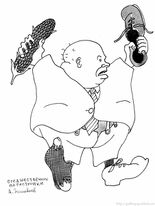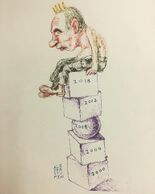Cargo cult
 Statue of airilane made of bamboo [1]
Statue of airilane made of bamboo [1]
Cargo cult (Культ карго) is religion based on idea, that the material possessions were acquired not by manufacturing them, not by hard work, but as a result of some “right” prayers and rituals.
Cargo cult is attempt to imitate behavior of some more successful people, classes, countries without understanding, how does it work [2].
In the similar meaning, the expression "wants the milk without the cow" is used [3][4].
Animals
Richard W.Byrne indicates that animals (monkeys) tend to imitate some actions, but do not seem to learn by imitation. [5]
History and etymology
Term Cult cargo had been created in century 20, after World War II. The barbarian tribes met the American airplanes used to deliver the military cargo. American soldiers tried to maintain good relations with the natives, and were successful in this. The natives considered the airplanes as a gift from gods, and tried to serve these gods in a way, they did serve gods during many generations. The emulations of cargo airplanes, that appeared in this activity, become symbol of the phenomenon and gave it name Cargo cult. [6]
Attempts to get airplane, emulating them with bamboo and leafs (instead of to learn mathematics, physics, chemistry, metallurgy, aerodynamics, etc.), is considered as classic example of Cargo cult.
Lifestyle
Belonging to the "Rich class" sometimes is associated with extensive use of luxury. Such a custom is considered, at least intuitively, as a way to richness. Several authors indicate, that the common perception of rich people is often just wrong [7][8][9]. In the simila way, construction of bamboo airplanes does not help natives in learning sciences and development of technology.
Religion
 Military pope [10]
Military pope [10]
Wearing of religious attributes, performing magic rituals often is considered as a way to God.
Science
Cargo cult is observed in emulations of science. It is considered as activity of emulating the accessories borrowed from civilized countries, mounting some expensive equipment or writing some formulas, without to formulate and revise any new scientific concepts. [11]
Attempts to separate science from its imitations (Kargo cult) are presented in article Place of science.
Imitation of state institutes
In century 17, Peter the Great tried to bring the European technology and science to Russia. [12] Perhaps, Peter did not understand, that certain freedom is necessary for science, and the technology cannot develop without science. He could build-up the great channels to promote the transport. But he could not use them, as the people around were his slaves. Three centuries later, Stalin repeated the attempts with channels, with similar results: many people dead, but the channels did not help industry.
Peter "made window to Europe" [13], but he did not make door. He just did not understand, how does it work in Europe.
That time, term Cargo cult was not yet invented, but those phenomena can be qualified as Cargo Cult.
On 1959, Soviet dictator Khruschev Nikita Sergeevich visited the USA. [14]. Khruschev tried to learn the American style of industry and reproduce it in the USSR. (And even better, due to the only true theory of Marx-Lenin.) Either Khruschev did not understand, that it does not work without free market of labor, goods, technology, that it requires democracy, or he initially considered sovetism as a fake for fool citizen, who were forced to believe, that The Current Generation of Soviet People Will Live Under Communism. Khruschev, instead of democratization of the USSR, continued repressive politics, see Novocherkassk murder (Новочеркасский расстрел), 1962; no any attempts are detected to buildup the communism, promised for year 1980 (see 1961.ProgramKPSS), just cultivation of corruption and criminal.
Creation of imitations of democratic institutes in a barbarian country is a cargo cult. Imitation of parliament, imitation of the election procedures (see Election fraud), censorship pretend to give impression of prosper democratic society.
The imitation does not work as a democratic institute, as the statue of airplane does not fly. In the case of Russia, such imitations are expected to lead to the collapse of the country during century 21, see Collapse of RF.
References
- ↑ https://world.edu/college-cargo-cult/ Professor Doom. The College cargo cult. September 25, 2017. As the student loan debt is now getting closer to 2 trillion dollars than 1 trillion dollars, it’s time to consider how it happened.// “Cargo Cult” refers to religious splinter groups that kept forming among the stone-age tribes in the Pacific as they encountered modern civilization, during the 20th century. The best book to discuss it is Road Belong Cargo, which has a great account and many fascinating insights into why these cults kept finding followers. The basic idea of the cult was that material possessions were acquired not by manufacturing them or by hard work, but as gifts from the gods as a reward for the “right” prayers and rituals. ..
- ↑ https://business-digest.eu/en/2019/06/17/are-you-guilty-of-cargo-cult-thinking-without-even-knowing-it/ Gaelle BRUNETAUD-ZAID. Are you guilty of “cargo cult” thinking without even knowing it? June 17, 2019, What is a cargo cult? It’s when we imitate behaviors without understanding how they work in the hope of achieving the same results. Naturally enough, it’s not something that works. // In the first half of the 20th century, the indigenous population of Melanesia looked on as cargo planes landed on their islands weighed down with incredible payloads. Even though the islanders had no idea how these goods were manufactured in the West, they began imitating these artifacts. They made radios from wood, airplanes from straw, and landing strips out of sand — but without getting the same effects. Hence the metaphor of the “cargo cult.” Yet we should refrain from being condescending toward the Melanesians: when we set up agile processes, when we think that Lean Startup and Scrum are methods that will help us do things faster and more cheaply, we’re hardly any better. // Imitating practices without shifting underlying principals — i.e., mindset, leadership style, and culture — isn’t just as useless as an airplane made of straw; it’s also extremely counterproductive. The illusion of being right makes some people become more rigid, and others more uncomprehending. It also adds constraints that hinder the emergence of genuine transformation. The more distant an organizational culture is from an agile culture, the more likely that change based on a copy-and-paste approach will generate inertia, resistance, and confrontation. A truly agile organization adopts a state of mind that is grounded in ruthless, uninterrupted improvement, all designed to eliminate any terrible cargo-cult or zombie-Scrum thinking.
- ↑ https://theconversation.com/russias-great-at-invention-but-stinks-at-innovation-35940 Loren Graham. Russia’s great at invention, but stinks at innovation. January 16, 2015 9.57pm AEDT. .. To Putin, like past Soviet and tsarist rulers, modernization means getting his hands on technologies but rejecting the economic and political principles that pushed these technologies elsewhere to commercial success. He wants the milk without the cow. And so long as his policies remain in effect, the scientific genius of the Russian people will remain economically unfulfilled.
- ↑ https://spicyip.com/2015/03/invention-vs-innovation-in-russia.html Kiran George. Invention vs. Innovation in Russia, March 1, 2015 , .. “You want the milk without the cow!” (sic) In his brilliant article, Loren Graham, Professor at MIT, recounts his experience on a visit to Russia, accompanied by colleagues.// “To Putin, like past Soviet and tsarist rulers, modernization means getting his hands on technologies but rejecting the economic and political principles that pushed these technologies elsewhere to commercial success. He wants the milk without the cow”.
- ↑ https://www.sciencedirect.com/science/article/pii/S0960982205006664 Richard W.Byrne. Social Cognition: Imitation, Imitation, Imitation. Current biology, Volume 15, Issue 13, 12 July 2005, Pages R498-R500. Monkeys recognize when they are being imitated, but they seem unable to learn by imitation. ..
- ↑ 2007.08.25. https://www.youtube.com/watch?v=qmlYe2KS0-Y Cargo Cult. •Aug 25, 2007. iPeteCTorg
- ↑ https://www.lifehack.org/articles/money/10-differences-between-middle-class-and-rich-people.html Kalen Bruce. 10 Differences Between Middle Class And Rich People. 2020.07.09.
- ↑ https://hackernoon.com/the-things-i-learned-from-the-millionaires-b6ed96fdfd09 The things I learned from the millionaires. Originally published by Filip Poutintsev on October 10th 2018.
- ↑ . https://www.fastcompany.com/90367133/5-lies-youve-been-told-about-rich-people-and-money Pavithra Mohan. 5 lies you’ve been told about rich people and money. 06-25-19.
- ↑ http://gurusveta.livejournal.com/51665.html Боевые попы. Mar. 7th, 2015 at 4:00 PM
- ↑ http://calteches.library.caltech.edu/51/2/CargoCult.pdf R.Feynman. Cargo Cult Science. 1974 June.
- ↑ https://courses.lumenlearning.com/boundless-worldhistory/chapter/the-modernization-of-russia/ Boundless World History. Peter the Great. (2020) The early years of Peter the Great were marked by power struggles among multiple heirs to the Russian tsardom as well as Peter’s European travels, which greatly inspired his modernizing reforms.
- ↑ https://wol.jw.org/en/wol/d/r1/lp-e/102003608 St. Petersburg—Russia’s “Window on Europe”. (2020)
- ↑ https://www.pbs.org/video/american-experience-khrushchev-journey/ American Experience. Khrushchev's American Journey Clip: Season 26 Episode 7 | 32m 49s | Video has closed captioning. In 1959, Nikita Khrushchev was the first Soviet leader to visit the United States. This archival film from the United States Information Service details Khrushchev's twelve day tour from Washington DC to New York, California, Iowa, and Pennsylvania. Aired: 11/18/14
https://en.wikipedia.org/wiki/Cargo_cult Cargo culting was a specific phenomenon and later a general concept. The specific phenomenon was the belief which began among Melanesians in the late 19th and early 20th centuries that various ritualistic acts such as the building of an airplane runway would result in the appearance of cargo via airplanes, even though they did not have a specific reason to believe that airplanes would land on their site.[1][2]. The term was then debated as a more general concept in anthropology and sociology afterward. More recently, "cargo culting" is a general term to describe the adoption of a technology or practice based on the observation that it has been used elsewhere, without understanding the motivation for its use elsewhere.// The term was first used in print in 1945 by Norris Mervyn Bird, repeating a derogatory description used by planters and businessmen in the Australian Territory of Papua.

